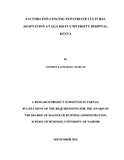| dc.description.abstract | The increasing globalization of the world requires new measurements for businesses if they are to succeed in the international market. Cultural gaps have a great effect on the difference between living and working in one‟s home country and abroad. The study was based on human capital theory, which states that international migration depends on standard components of individual capital as age, gender, education, skill, experience, marital status, as well as on personality features (ambition to succeed, entrepreneurial spirit, or a willingness to take risks by changing language, culture, and social environment). Expatriates working in Kenya tend to be either highly paid managers of multinational companies, or development and NGO employees and volunteers. Health care industry in Kenya and more specific at Aga Khan University Hospital continues to receive expatriates to compliment local expertise on highly specialized clinical or medical areas | en |

